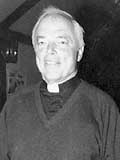-
- Bishops announce anti-gay marriage initiative
- Gay student group wants official recognition at Seton Hall
- Marriage debate echoes civil rights struggles
- Matthew Shepard’s mother lobbies for hate-crimes bill
- Conservative Episcopal organization meets
- Attorney for man accused of killing priest seeks access to report
- University celebrates King holiday
- Another amendment proposed
- National News Briefs
- World News Briefs
national
Marriage debate echoes civil rights struggles
‘Separate but equal’ denounced
Published Thursday, 22-Jan-2004 in issue 839
BOSTON, Mass. (AP) — A 21st century battle for gay rights is being fought with rhetoric from the civil rights movement of the 1960s — ideals that have echoed through Massachusetts’ gay marriage campaign from its outset.
Denunciations of “separate but equal” laws have energized a crowd of protesters fighting for new rights.
U.S. Rep. John Lewis, who helped organize the famous 1963 March on Washington, has weighed in with a brief to the state’s highest court, as the legislative phase of the debate began and the courts prepared to revisit the landmark decision.
“Let freedom ring. Let freedom ring. My God Almighty, let freedom ring,” the Rev. George Welles, an Episcopalian minister, proclaimed last week, paraphrasing Dr. Martin Luther King Jr.’s famous speech made at the 1963 march.
Welles spoke at a rally celebrating the state Supreme Judicial Court’s gay marriage decision. In the November ruling, a split court decreed it unconstitutional to bar same-sex couples from the rights and responsibilities of marriage.
In a fortuitous twist for gay rights advocates, the timeline established by the court could lead to the first state-sanctioned gay weddings in the United States on May 17 — the 50th anniversary of the U.S. Supreme Court’s decision striking down school segregation.
“God has a very good sense of humor,” said Gary Daffin, co-leader of the Massachusetts Gay and Lesbian Political Caucus. “For those of us who are both black and gay, the parallel between the civil rights movement of forty years ago and the gay rights movement of today is very apparent.”
Other black Americans, however, have taken umbrage at comparisons to the fight for racial equality.
“As an African-American, I find it highly offensive to associate homosexuality with civil rights,” said the Rev. Steven Craft, 60, a retired pastor from New Jersey. “People have been trying to run on that civil rights banner and to use this whole idea of homosexual marriage to say it’s the next wave of the movement. But race and sexuality have nothing to do with each other.”
In recent weeks, the focus of the Massachusetts debate has turned to the Legislature, which is contemplating a constitutional amendment that would define marriage as a union between one man and one woman. It is also considering a civil unions bill that would give gay couples the benefits — but not the title — of marriage.
The state Senate has asked the high court whether the civil unions bill would meet constitutional muster. Senate President Robert Travaglini has said he will postpone a scheduled Feb. 11 vote on the constitutional amendment if the court has not given an answer by then. If approved by the Legislature, the amendment could appear on a ballot for voter consideration no sooner than November 2006.
References to the civil rights fight against the ban on interracial marriages were numerous in both the plaintiffs’ arguments to the Supreme Judicial Court and, subsequently, in the majority opinion issued Nov. 18.
The decision said that the past rulings on interracial marriage made clear that “the right to marry means little if it does not include the right to marry the person of one’s choice.”
As in those rulings, the court said, the gay marriage case revolves around a statute that “deprives individuals of access to an institution of fundamental, legal, personal and social significance.”
|
|
Copyright © 2003-2025 Uptown Publications


